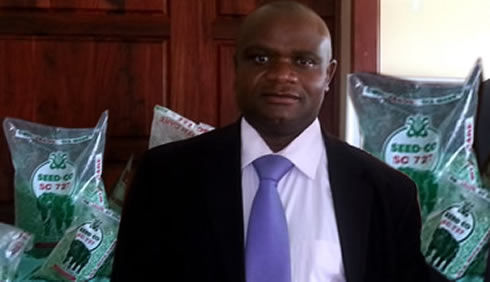SEED CO will receive the last tranche of capital amounting to $28 million from its US technical partner Limagrain before end of year under an equity deal valued at $40 million.
The funding is expected to further reduce high finance charges Seed Co has been incurring due to the huge debt on its balance sheet and support its expansion into the region.
Chief executive Mr Morgan Nzwere last week said Seed Co paid more than $7 million in net finance costs last year. This should fall significantly after further injection of fresh capital. Seed Co was borrowed to the tune of $36 million last year.
"I talked about our technical partner (earlier); this is going to be the game changer going forward. We expect the last tranche of $28 million (from Limagrain) by November," he said.
"That is going to reduce the cost of funding. Net interest was around $7 million in 2014, we expect that to come down significantly."
Finance charges increased to $7,9 million from $7,4 million in 2013 due to delayed receipts from Government and related institutions, which strained cash flows.
Mr Nzwere said finance charges remain high although the group's borrowings were now below 10 percent, which he said was still worrying and needed to come down once more.
Seed Co has managed to whittle down the cost of its funding after clearing part of its debt from the initial $10 million that Limagrain has already paid.
Limagrain, through its unit Vilmorin and Cie, has already acquired 15 percent stake in Seed Co - the first tranche of shares under the deal - after it was issued with 37,6 million shares and concurrently bought another 20,5 million shares, a portion of Aico's stake in Seed Co through placement.
The second part of the equity transaction, will see Seed Co issuing 27,3 million new ordinary shares to Limagrain, which at that point would gain an effective 25 percent stake in Seed Co.
Mr Nzwere said apart from helping to reduce costs from borrowed funds, the fresh capital would also help Seed Co reduce by 50 percent the time it took to develop new varieties.
"Limagrain would also help in terms of our ability to reduce the time it takes to develop new varieties for product growth," he said.
Seed Co contends it would now be able to use the technical expertise and laboratories of its technical partner to reduce the time of breeding new varieties to five years from about 10.
This would be critical for the Zimbabwe Stock Exchange-listed seed producer's regional expansion. It has made strides in penetrating Nigeria, Kenya, Tanzania, Uganda and DRC. The group is also exploring opportunities in Ethiopia. Seed Co already has footprints in Zambia and Malawi.
Volumes now average 4 000 metric tonnes per year in Tanzania and Kenya from less 1 000 metric tonnes a few years back. Each is seen as a 30-35 000 metric tonne market.
Mr Nzwere said with more than 85 percent of the local seed market, it was difficult to achieve accelerated growth of the business, which could be achieved by going to new markets.
"We now have 85 percent of the seed market in Zimbabwe. Once you have that much market share it becomes difficult to grow the business, to grow it you must go out."
The seed producer wants Zimbabwe, which accounts for about 33 percent of its profits, to constitute only about 20 percent with the balance coming from other investments in the region.
Presenting the group's financial results for the year to March 2014, finance director Mr John Matorongofa said group revenue increased by 16 percent to $120 million, driven by maize up 16 percent and winter cereals, which rose 31 percent.
Group after tax for the period declined marginally from $12,4 million to $11,8 million largely due to the effect of impairments.
Margins were flat at 45 percent due to stock write downs to ensure quality is maintained on all seeds and re-handling costs for the changeover to a new fungicide and packaging.
Overheads were 4 percent higher than the prior period before exceptional items of $3 million being impairment of deposit receivable from a local financial institution under curatorships.
Further, the seed producer said the overheads also entail a $2 million provision for bad debts across the group to take account of slow moving retail debtors from previous years.
- The Herald
 Concern over Masvingo black market
Concern over Masvingo black market  Kenya declares three days of mourning for Mugabe
Kenya declares three days of mourning for Mugabe  UK's Boris Johnson quits over Brexit stretegy
UK's Boris Johnson quits over Brexit stretegy  SecZim licences VFEX
SecZim licences VFEX  Zimbabwe abandons debt relief initiative
Zimbabwe abandons debt relief initiative  European Investment Bank warms up to Zimbabwe
European Investment Bank warms up to Zimbabwe  Young Investment Professional (YIP) Graduate Programme 2019
Young Investment Professional (YIP) Graduate Programme 2019 











 Young Investment Professional (YIP) Graduate Programme 2019
Young Investment Professional (YIP) Graduate Programme 2019
Editor's Pick